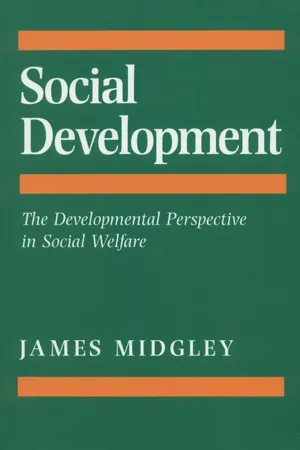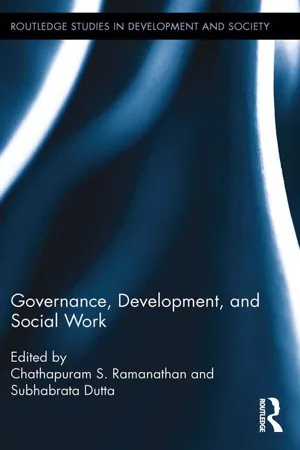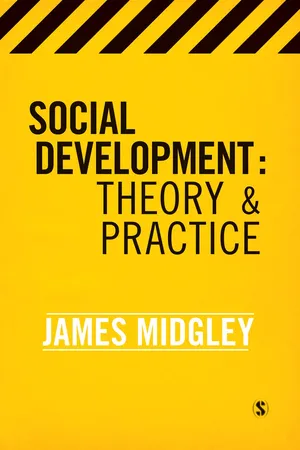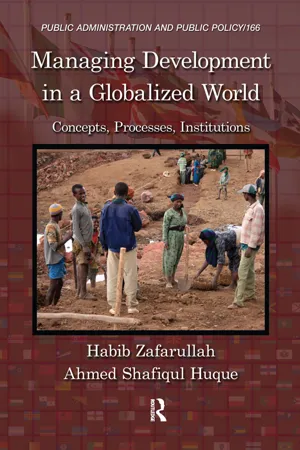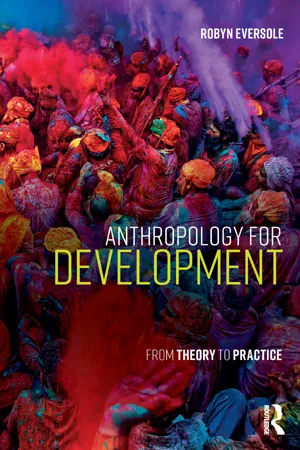Social Sciences
Global Development
Global development refers to the progress and improvement of living standards, economic opportunities, and social well-being on a worldwide scale. It encompasses efforts to reduce poverty, inequality, and environmental degradation, as well as promote sustainable development and human rights. Global development initiatives often involve collaboration between governments, international organizations, non-governmental organizations, and other stakeholders to address complex challenges facing the global community.
Written by Perlego with AI-assistance
Related key terms
6 Key excerpts on "Global Development"
- Ken Browne(Author)
- 2017(Publication Date)
- Polity(Publisher)
3Global DevelopmentTOPIC 1
Development, underdevelopment and global inequality (pages 94–113)Defining development (page 95)
Most sociologists concern themselves with development as the goal of achieving a desirable society by deliberate policies aimed at economic growth, and raising living standards.- Economic development generally involves economic growth (a bigger economy) accompanied by rising living standards.
- Social development focuses on the everyday experiences and opportunities that people have and their general happiness and well-being – e.g. educational opportunities; health and access to healthcare; democracy; human rights; and gender equality.
- The reduction or elimination of poverty – combining successful implementation of economic and social development. Amartya Sen argues that development is about overcoming poverty because it is necessary to have a minimum living standard to take part in everyday life, and this allows people to develop their potential and increases human freedom.
Measuring development (pages 95–101)
Economic development
This is usually measured by increases in Gross National Income (GNI) – the total value (in US dollars) of goods and services produced in a country in a year. This is usually expressed as GNI ‘per capita’ (per person in the population) to allow for differences in the size of populations between countries.GNI per capita can be a misleading measure of development because:
- ➤ It does not measure social development.
- ➤ It is an average for the whole population, and so might disguise inequalities in its distribution.
- ➤ It only counts what happens in the ‘official’ economy; some important activities are not counted – e.g. growing food for one’s own consumption. Storey argues these are often activities carried out by women, so that GNI can be seen as gender-biased.
- ➤ It tells us nothing about the nature or side-effects of development
- eBook - ePub
Social Development
The Developmental Perspective in Social Welfare
- James Midgley(Author)
- 1995(Publication Date)
- SAGE Publications Ltd(Publisher)
While social development is particularly concerned with those who are neglected by economic growth or excluded from development (such as the inner city poor, impoverished rural dwellers, ethnic minorities and women), its concern for these groups takes place within a wider universalistic context of interventions that promote the welfare of all. Another aspect of social development’s universaliem is its spatial focus. Within the context of its universaliem, social development seeks to promote social welfare within specific spatial settings such as inner city areas, rural communities, cities, regions or countries. Finally, the goal of social development is the promotion of social welfare. As shown earlier, the term ‘welfare’ is used in this book in its broadest meaning to connote a condition of social well-being which occurs when social problems are satisfactorily managed, social needs are met and social opportunities are created. The condition of social welfare is fostered through various mechanisms or institutions. With its interventionism, commitment to progress, macro-focus, universaliem, integration of social policy with economic growth, socio-spatial focus and eclectic, pragmatic approach, social development is the most inclusive of all approaches for promoting social welfare today. OTHER CONCEPTIONS OF SOCIAL DEVELOPMENT The definition of social development offered in this chapter is only one of several in current use. Other definitions of the term have been formulated in academic subjects such as psychology, sociology, social work and development studies. An understanding of these different usages will help not only to clarify the field, but to put the definition used in this book into perspective. Academic research in these different disciplines has also contributed to the definition of social development which is used in this work. As was suggested earlier, the political economy approach inspires thinking about social development - eBook - ePub
- Chathapuram S. Ramanathan, Subhabrata Dutta(Authors)
- 2013(Publication Date)
- Routledge(Publisher)
Development will be very short lived and self-destructive unless it is sustainable in the sense that it meets the needs of the present without compromising the ability of the future generations to meet their needs (World Commission on Environment and Development, 1987). This suggests that economic, environment, migration policies, international law, and health must be systematically coordinated for sustainable economic, social, and political development (Ramanathan & Link, 2004, 1999; Rogge, 2001). Consequently, there is an urgent and growing recognition that social workers and social development practitioners understand their neighbors and their role in the world. In a time of tension and social distress, increasing global awareness expands our vision for practice and empowerment. Following many experiences of learning from colleagues worldwide the authors believe, “that social workers across the globe can always learn from each other in an atmosphere of reciprocity where social and economic justice are twin goals” (Ramanathan & Link, 1999). Many recognize the necessity of studying global interdependence, but, “Only a handful of programs require courses on international social work (Khinduka, 1999). Over the last decade, more programs are offering courses on international social welfare, and this development is encouraging.Recently, the ideal of international cooperation espoused in the Declaration of Human Rights has been challenged by a New World Order where economic and military might dominates social life (Rieff, 2003). Social workers are practicing at the crossroads of economic and social development where peaceful relationships are jeopardized by human aggression. Politicians are saying that we should put a human face on the global economy, but it is yet to be actualized and we are concerned that the goal not stagnate or be seen as too idealistic. In his discussion of the “truth about globalisation,” Legrain points out the consequences of exploiting children (Legrain, 2002). Simultaneously we find that child workers are demonstrating in New Delhi against harsh conditions and low pay, and children overflowing from homeless shelters in Chicago. As suggested by Link and Ramanathan (2011), students have become more aware of their purchasing power and in response to news of child workers have made an impact on clothing manufacturers and maquiladores (US-owned plants operated in Mexico and Central America) through their travel exchanges, volunteer work, and electronic mail campaigns. As social workers and social development practitioners, it is our ethical obligation to the oppressed, wherever they are, to be able to unite in effective strategies and bring global issues to the forefront of socio-economic change.The present era of globalization creates a differential impact and poses a critical dilemma for both the developing countries or emerging economies and advanced economies. On the one hand, the emerging forces of market economy are striving to adapt some of the traditional powers and responsibilities of the state even in basic sectors in the name of structural adjustment. On the other hand the failure of governmental initiative to foster people-oriented development has led to the mushrooming of NGOs and people's movement impinging critically on the agenda of development both within and outside the national borders. All this prompts questioning of the state's responsibility in the development process. But neither the market, nor for that matter any other non-governmental agency, can substitute for the non-state which at least in the foreseeable future looks to be the hub of all policy actions in the process of social development. On the other hand, some advanced economies are being challenged with movement of people and multiculturalism and there has been a wave of anti-immigrant sentiments; yet, other advanced economies are struggling with evolving of immigration policies that factor managing of the demography shift and its influence on the cultural ethos of those nation-states. Also, advanced economies are being challenged by unprecedented forces of the global market place, and the labor market, monitory and health care policies that are conceived and implemented, that was effective in the past to deal with the fluidity in the market place are no longer tenable. - eBook - ePub
Social Development
Theory and Practice
- James Midgley(Author)
- 2013(Publication Date)
- SAGE Publications Ltd(Publisher)
PART I UNDERSTANDING SOCIAL DEVELOPMENTPassage contains an image 1 DEFINING SOCIAL DEVELOPMENT
Even though the term social development has been in regular use for more than half a century, it is still poorly defined. Today, it is used to mean different things. It is often associated with community-based projects in the developing countries such as microenterprises, women’s groups, cooperatives, maternal and child welfare programmes, the provision of safe drinking water and the construction of schools and clinics. It also refers to government policies and programmes concerned with the ‘social aspect’ of development, such as reducing poverty, increasing literacy, combating malnutrition and improving access to health and education. This usage reflects international efforts to promote the Millennium Development Goals, which were adopted at the United Nations Millennium Summit in New York in 2000. In contrast to this practical approach, the term is also used to connote the achievement of lofty ideals, such as progress, social integration, peace and social justice.Scholars working in different academic fields have also used the term in different ways. It is closely associated with development studies, where it is perhaps most frequently employed, but it is also influenced by scholarly work in sociology, social work and social policy. Sociologists have used the term to describe a process of ‘guided’ social change that improves society while some social workers have linked social development to community-based projects. Some have also invoked abstract ideals to characterise the field. As is well known, psychologists employ the term to refer to childhood development. It has also been used in social policy to refer to social improvements brought about by government ‘welfare state’ initiatives and it also characterises recent discussions among social policy writers on what is called ‘welfare developmentalism’. - eBook - ePub
Managing Development in a Globalized World
Concepts, Processes, Institutions
- Habib Zafarullah, Ahmed Shafiqul Huque(Authors)
- 2017(Publication Date)
- Routledge(Publisher)
The field of development is replete with confusion and debates regarding the concept, its interpretations, goals, strategies, and outcomes (see Huque, 2009). Rapid changes in the first decade of the twenty-first century have rendered many of the early ideas obsolete and induced rethinking on the relevance of development to globalization, governance, and, most importantly, poverty alleviation. Various forms and impacts of globalization have transformed the nature of economies worldwide, state–society relations within nations, and the methods of transnational transactions. Globalization has reconfigured social relations, increased social disparities, caused social instability, produced greater social and economic inequality, threatened traditional cultures, and disrupted ecological equilibrium. Huntington (1993: 26) argues that “economic modernization and the social change throughout the world are separating people from long-standing local identities, as well as weakening the nation-state as a source of identity.” On the other hand, diversity gains in the form of pluralization, differentiation, contestation, glocalization, and institutionalization have been achieved through global interconnectedness (http://sociology.emory.edu/globalization/issues05.html). Diverse development opportunities that have been created for the DCs must be judiciously approached to obtain positive social change—change that will address the problems and issues relating to poverty, social exclusion and discrimination, the gender gap, nonparticipation and disempowerment, all of which are still prevalent in many DCs. Thus, the need for enhancing capacity and action at the local and national levels within the global context has become so prominent. In other words, the globalization phenomenon has initiated debates over the revitalization of regional forces and integration of local needs in designing development programs, with reference to global standards and practices.The history of most developing nations is rooted in colonialism, and the character of postcolonial states was strongly influenced by it. This was evident in approaches to leadership and governing. In the early days, the state emerged as the most powerful actor in the developmental process because of its control over resources, personnel, and power. It played a prominent role, and early efforts at development were state centered, and its agencies assumed the command in implementing programs. However, as states attempted and faltered in the move toward development, several weaknesses in the process were identified. In most cases, traditional colonial structures and institutions were found to be major obstacles, especially the bureaucracy, which was engaged in administering development programs. Outdated rules and procedures formulated with scant regard to the ideals of modern democratic states caused further problems. - eBook - ePub
Anthropology for Development
From Theory to Practice
- Robyn Eversole(Author)
- 2017(Publication Date)
- Routledge(Publisher)
CHAPTER 1 Anthropology of development in theory Development can be defined broadly as the process of social and economic change. Change may be planned or unplanned. Development professionals, however, are specifically interested in change that can be imagined, planned for and created. For development professionals ‘development’ is a planned change process that increases prosperity or well-being or social equity – depending on what kind of change they feel is most needed. The Brundtland Commission’s definition of development from the 1980s puts the emphasis on sustainable change: development meets human needs in the present without compromising future generations’ ability to meet their needs. 1 In 2015, the 2030 Agenda for Sustainable Development identified three key pillars of development as ‘people, planet and prosperity’ with a focus on poverty eradication. 2 Every definition of development has a slightly different focus and emphasises different desired outcomes. But each refers to a process of social and economic change that is aiming to make the world better than it is now. This chapter will explore some of the many ways that development, as planned social and economic change, is understood, practised and experienced around the world. To do this, it draws on the work of anthropologists who study development. This chapter does not attempt to canvass the entire range and richness of anthropology theory. Rather, it focuses in on some key insights from the anthropology of development which are relevant to development professionals, and which can directly inform development practice. Development in context Theories are sets of ideas about how the world works. Our ideas about how the world works – our theories – are important, because they guide our actions and ultimately inform what we can achieve. In development practice, our theories about social and economic change guide how we go about pursuing change
Learn about this page
Index pages curate the most relevant extracts from our library of academic textbooks. They’ve been created using an in-house natural language model (NLM), each adding context and meaning to key research topics.

